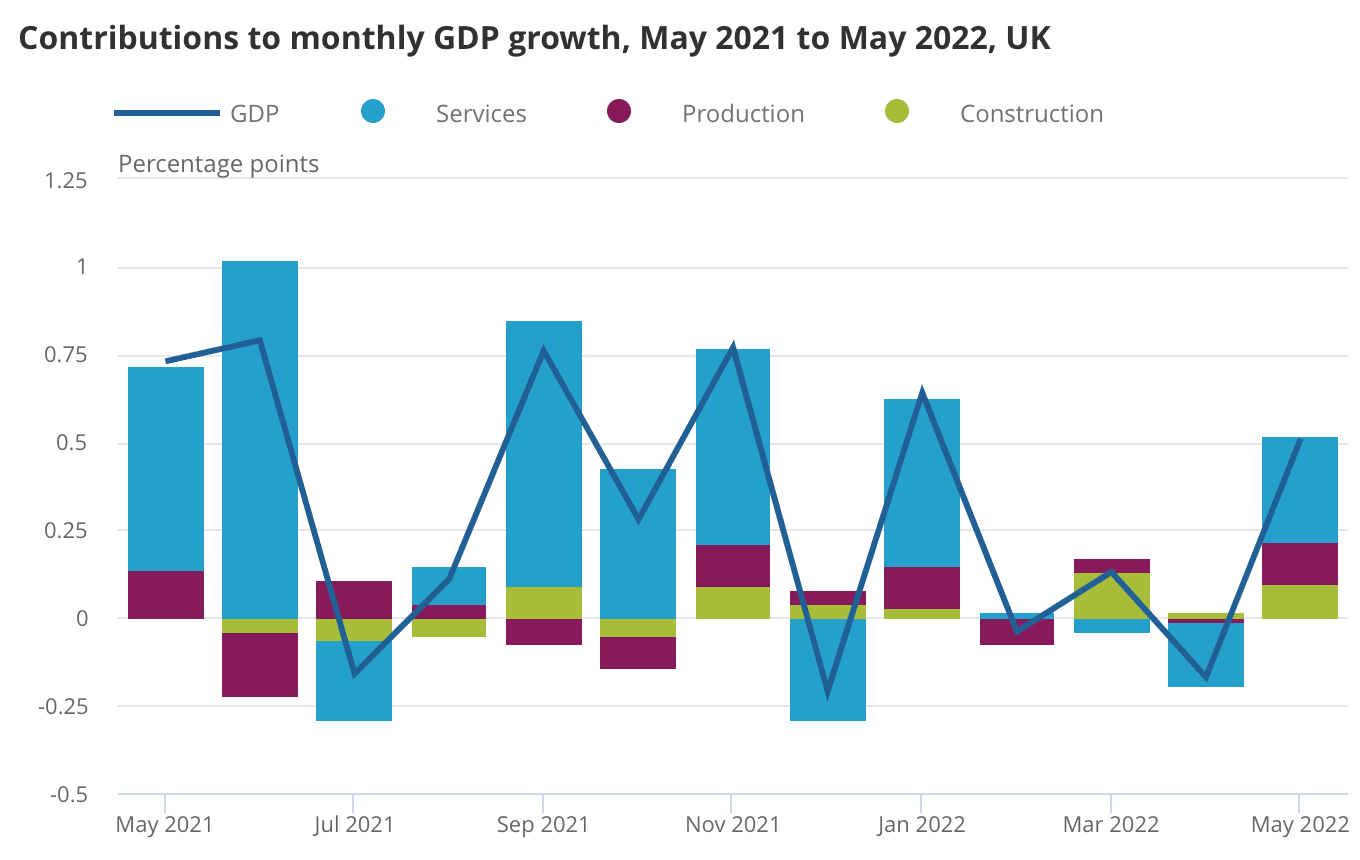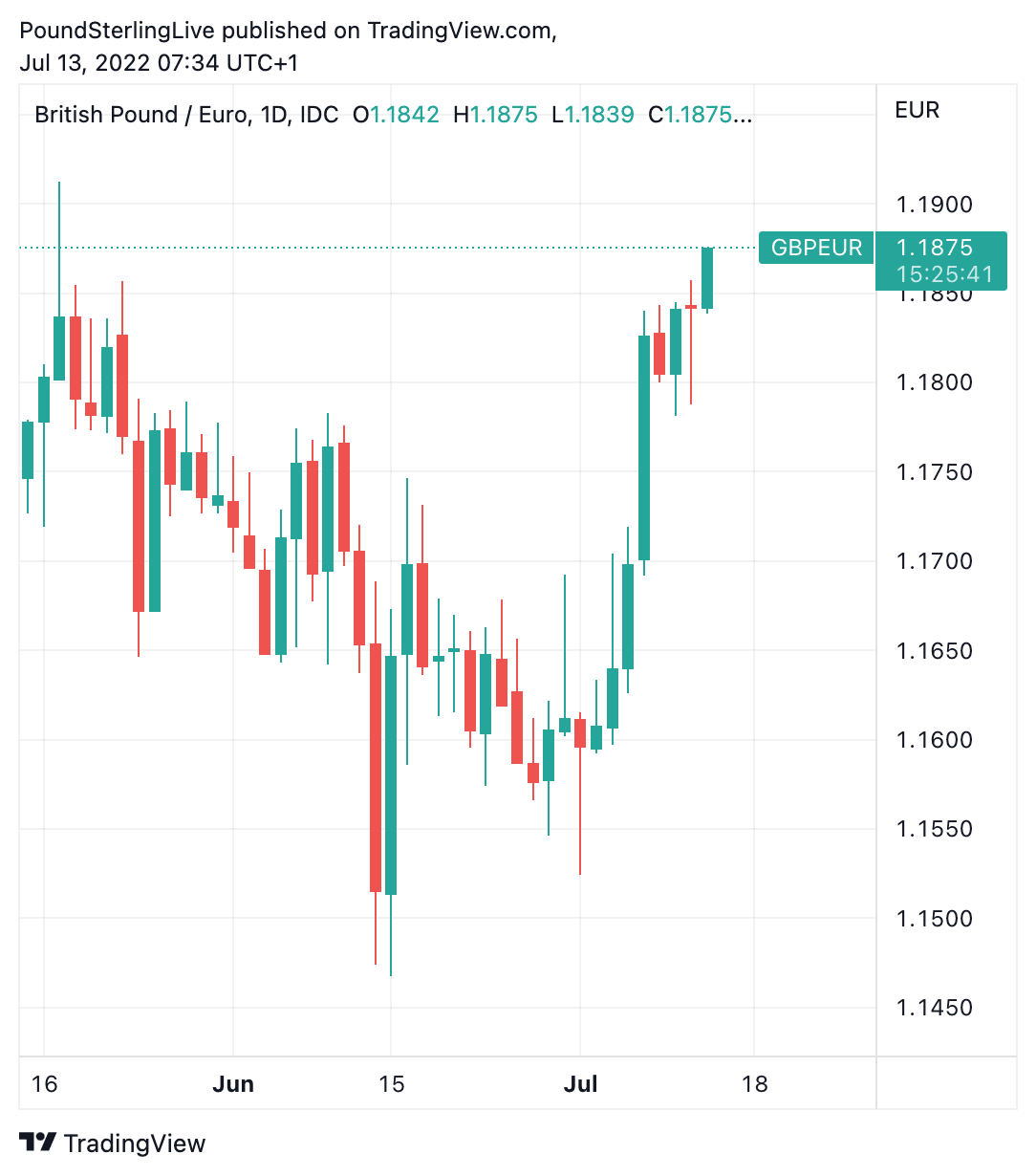Boost for the Pound as UK GDP Beats Expectations
- Written by: Gary Howes

Image © Adobe Images
The British Pound was firmer in midweek trade, in line with some better than expected economic data.
UK GDP rose 0.5% in the month to May said the ONS, beating expectations for growth of 0.1% and a return to growth having posted -0.2% in April.
In the three months to May the economy grew 0.4% which bettered a consensus forecast of 0%.
"Maybe everything is actually ok in the UK given this latest GDP report," says Viraj Patel, Macro Strategist at Vanda Research.
All components of the UK economy contributed to the better than expected data: manufacturing production increased 2.3% in the month to May against a consensus forecast for 0.2%. Industrial production grew 0.9% against expectations for zero growth and construction output increased 4.8% against the 4.4% expected.
Image courtesy of ONS.
The all-important index of services - important because it represents the largest sector of the UK economy - rose 0.1%, beating expectations for -0.1%.
The beat on expectations blows in the face of a negative consensus towards the UK economy and is therefore in balance supportive of the Pound.
"In a surprising turn of events, today’s UK economic data was very good relative to expectations and recent trends," says Neil Birrell, Chief Investment Officer at Premier Miton Investors. "Sterling should get a welcome boost and some confidence might be restored in the eyes of international investors given the issues in the UK at present."
The Pound to Euro exchange rate is quoted a quarter of a percent higher at 1.1870, meaning banks are quoting around 1.1540 for euro payments and independent providers are quoting 1.1830.
The Pound to Dollar exchange rate is quoted a third of a percent higher at 1.1910, bank accounts are seeing dollar payments at around 1.1578 and independent providers at 1.1870.
Above: GBP/EUR daily.
Compare Currency Exchange Rates
Find out how much you could save on your international transfer
Estimated saving compared to high street banks:
£2,500.00
Free • No obligation • Takes 2 minutes
Looking ahead, "May’s GDP data have not changed our expectations for a contraction in Q2," says Gabriella Dickens, Senior U.K. Economist at Pantheon Macroeconomics.
Pantheon estimates that the additional bank holiday for the Queen’s Jubilee—which will be treated as a special event by the ONS and thus will depress the seasonally adjusted data—will cause GDP to fall by around 1.5% month-to-month in June.
Consumer confidence readings meanwhile remain depressed confirming the services sector will likely see ongoing headwinds.
"Nonetheless, a recession - two consecutive quarters of negative growth - remains unlikely. Households’ real disposable incomes should rise in Q3, in response to the increase in the threshold for NI contributions and Cost of Living grants from the government," says Dickens.
The strength in May was fairly broad-based, with positive growth in services, production and construction," says economist Steffan Ball at Goldman Sachs.
"Folding in both the back revisions and the surprising jump in activity in May boosts our estimate of Q2 GDP growth from -0.7% to +0.3%," he adds.
Goldman Sachs assumes some of the positive momentum will continue into the coming months, which leads them to expect third quarter GDP to increase by +0.4% (vs +0.1% previously).
"Given we no longer estimate Q2 growth to be negative, we are lowering our recession probability for the year ahead to 35% (from 45% previously)," says Balls.
This is now just slightly higher than in the U.S. where odds of a recession sit at 30%.
But the odds are lower than in the Eurozone where Goldman Sachs' economists price odds of a recession at 50%.
However, Modupe Adegbembo, G7 Economist at AXA Investment Managers says despite the upside surprise in May growth, the underlying activity figures remain subdued.
"Going forward the latest survey data and impact of the additional bank holiday point towards weak June data. On balance, we expect growth to fall by 0.3% in Q2," she says.
AXA expects third quarter growth to post a strong rebound of 0.8% due to the bank holiday adjustment and supported by fiscal measures.
"In our view, growth in Q4 hangs in the balance and we currently expect growth of 0.25% as households face rising utility bills and we expect economic activity to weaken," says Adegbembo.
Compare Currency Exchange Rates
Find out how much you could save on your international transfer
Estimated saving compared to high street banks:
£2,500.00
Free • No obligation • Takes 2 minutes






